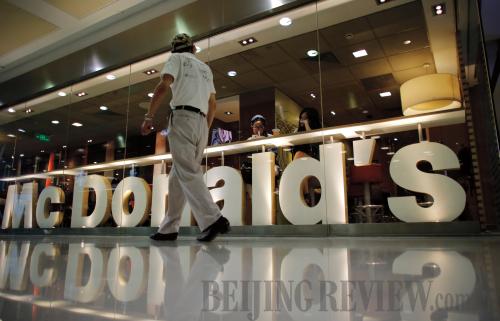|
 |
|
BYPASSING: A man walks next to a McDonald's restaurant at a shopping mall in Shanghai on July 28. The fast food chain took most meat dishes off its menus in China because of the food scandal involving its supplier (CFP) |
On the morning of July 29, customers arriving at the McDonald's in the Ganjiakou area of Beijing's Haidian District were disappointed to find that the store served nothing more than drinks and taro, pineapple and potato pies.
"Chicken nuggets and hamburgers are not available," said a female clerk, pointing at prominent signs posted on every cash register on the check-out counter, which stated McDonald's commitment to food safety and said that availability of these products will be resumed as soon as possible.
On July 28, McDonald's announced that it had stopped purchasing products from all Husi food factories in China; on the evening of July 20, Shanghai-based Dragon TV aired a program exposing Shanghai Husi Food Co. Ltd. for using expired and substandard meat.
Eighteen tons of frozen chicken skin and breast that expired half a month ago were ground up, coated with layers of starch paste and fried into the chicken nuggets that would later be shipped and served at McDonald's restaurants.
Veal chops that expired seven months ago were repackaged, with the original expiration date prolonged for another year. Meat products of inferior quality were blended into and sold as regular products.
These images, along with others shot at Shanghai Husi Food Co. Ltd., have shocked Chinese consumers, especially those who frequent Western fast food chains.
Shanghai Husi was the main meat supplier for a number of big-name international fast food brands with strong presence in China. The scandal has dragged a number of them into the fray with it—including McDonald's, Pizza Hut, Kentucky Fried Chicken (KFC) and Burger King.
Western fast food chains are popular among Chinese consumers. China is the third-largest market by number of restaurants for McDonald's and the top market by revenue for Yum! Brands—which owns Pizza Hut and KFC, according to Xinhua News Agency. Yum! Brands, Inc. also announced that its KFC and Pizza Hut restaurants had stopped using meat supplied by OSI China Holding Co. Ltd. (OSI China), which is a subsidiary of OSI Group, a U.S.-based global food processor. In addition to Shanghai Husi Food Co. Ltd., OSI has a number of factories in other part of China such as Henan, Shandong, Hebei, Yunnan, Fujian and Guangdong provinces.
Undercover reporters from Dragon TV broke the story, which took them two and half months to capture on footage.
Responses
After the scandal was exposed, OSI China posted a statement from Sheldon Lavin, Chairman, CEO and owner of the OSI Group on its website. Lavin wrote, "What happened at Husi Shanghai is completely unacceptable. I will not try and defend it or explain it. It was terribly wrong, and I am appalled that it even happened in the company that I own."
He then apologized on behalf of Shanghai Husi Food and the OSI Group. "I sincerely apologize to all our customers in China. We will bear responsibility for these missteps, and will make sure that they never happen again. That is my commitment."
Lavin said that local Chinese authorities have inspected OSI Group's other facilities in China and have not found any issue.
On July 26, the OSI Group declared that it will withdraw all products manufactured by Shanghai Husi Food from the marketplace.
The multinational company said that it is "conducting a thorough internal investigation into any possible failures on the part of current and former senior management" and a new management team has been brought in to China to ensure that operations run effectively.
| 